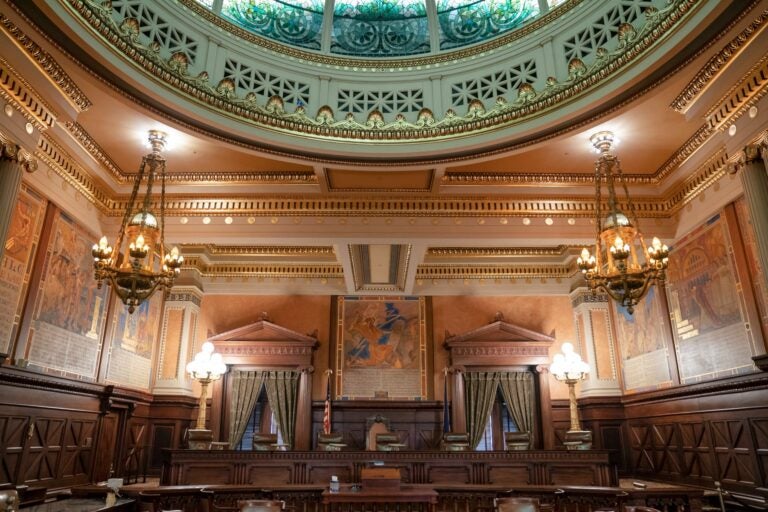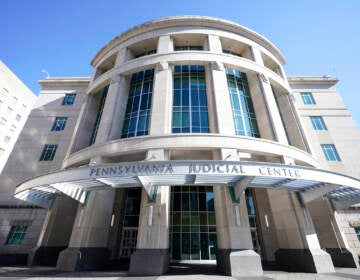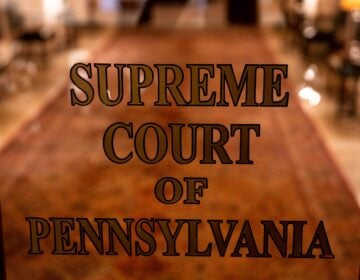Pa. Supreme Court justices up for retention make rare public appearance together in face of campaign to oust them
The three Democratic justices argued that partisanship does not guide their decisions. They face an unprecedented effort to unseat them.
Listen 1:27
File: Shown is the Supreme Court of Pennsylvania chamber at the Capitol in Harrisburg, Pa., Tuesday, Feb. 21, 2023. (AP Photo/Matt Rourke, File)
From Philly and the Pa. suburbs to South Jersey and Delaware, what would you like WHYY News to cover? Let us know!
As Pennsylvanians look ahead to the November election, an unusually intense fight looms over the retention of three Democratic justices on the state Supreme Court.
Normally a sleepy race, some right-wing activists aligned with President Donald Trump are actively campaigning against retaining Justices Christine Donohue, Kevin Dougherty and David Wecht, citing their past rulings on pandemic “lockdowns” and voting laws. The court currently leans Democratic, with a 5–2 majority, making the race this year a contest that could reshape the court’s ideological balance for years.
While justices who are up for reelection are limited in their ability to campaign, Pennsylvanians were granted a rare chance to hear directly from the three justices on this year’s retention ballot during the Committee of Seventy’s “Behind the Ballot – Fireside Chat,” held last night at Central High School in Philadelphia. The panel was moderated by Cherri Gregg, co-host of WHYY’s “Studio 2.”
During the discussion, the justices pushed back on the idea that they were partisan in the way they decide cases.
“We have to apply the law as we interpret it to exist and apply it, and the result is going to be what the result is going to be, but it’s the process that we must ensure is fair and following predictable rules in matters of statutory interpretation,” Wecht told the audience. “We must interpret and apply the law that the General Assembly gave us. They’re the policy makers.”
Wecht added that they are also called on to “interpret what the law should be,” but that “we’re also not free agents there either, because we must apply the precedents or find a way to distinguish them.”
Pennsylvania is one of only eight states that determines the makeup of its courts through partisan races, whereas, in most states, the governor appoints justices or they are chosen through nonpartisan elections. That has led to accusations of partisanship.
Dougherty pushed back on that assertion.
“The Constitution required us to run as a partisan, but the moment we were elected, when we put that black robe on, we hung up that partisan title and we have watched ourselves accordingly,” Dougherty said. “And when you look at the Pennsylvania Supreme Court, you’ll never hear us say it’s how many Democrats, how many Republicans? We say that we’re seven.”
Donohue added that the Democrats “disagree with each other all the time” and are often in alignment with Republicans.
“That’s a function of the interpretive process that we individually go through when we’re presented with an issue, and that’s true with our colleagues who were elected as Republicans,” she said. “So partisanship, honestly, from the time I served on the Superior Court to this very moment, has never been part of the function of my jurisprudence.”
Retention elections in Pennsylvania are typically quiet civic footnotes with low voter turnouts, likely evidence that voters lack an understanding of the role of appellate courts, such as the state Supreme Court. The fireside chat aimed squarely at bridging that knowledge gap.
The court is the final arbiter on questions related to Pennsylvania law. Justices are elected to 10-year terms after which they stand for retention elections, which are decided by simple yes-or-no votes on the ballot. If voters choose to retain a judge, they will then serve another 10-year term.
The justices on the panel told the audience that the system helps ensure that the court remains outside the influence of the other branches of government.
“The concept of an independent judiciary is incredibly important to remaining as a democratic backstop,” Dougherty said. “In Pennsylvania, it’s also critically important that the court will be the balance between the General Assembly and the executive [branch]. It’s how the Constitution was written. It’s for the perfection of making sure that no one particular side has enough authority to impose tyranny on another. That was its basic understanding, and 300 years later, it still remains.”
The court receives more than 2,000 appeals every year, all of which are reviewed by a justice, meaning that each must read 300 or more. Although law clerks help out, “it’s a lot of reading,” Dougherty said. Less than 10% of the appeals are granted. Then oral arguments are heard on those cases after which one of the justices is assigned to write a majority opinion.
“The real debate takes place in our writings,” Donohue explained. Then, if there is disagreement, another justice writes a dissent.
The court has had a significant influence on state and even national policymaking. The current court has upheld mail-in voting protocols, dismissed gerrymandered maps and even handled cases tied to abortion services and firearms regulations.
Some of those decisions prompted activists to do something almost unheard of: actively campaign against retention. That the justices have made themselves available to the public implies the elevated stakes in the face of an unprecedented campaign by right-wing activists to oust them.
Scott Presler, a Republican voter registration activist known for his grassroots efforts during the 2024 presidential election, is leading the campaign to get voters who have galvanized behind Trump’s “Make America Great Again” movement to vote against retention, citing their past rulings on pandemic “lockdowns” and voting laws. He accuses the Democrats on the court of helping Joe Biden win the presidency in 2020.
If Pressler and others are successful, they could shift the balance of power — potentially for years. If any of the three are removed, Gov. Josh Shapiro would appoint a temporary replacement until a special election could be held in 2027 to fill the seat for the next full 10-year term. However, Shapiro’s selections would have to be approved by the Republican-controlled state Senate, which could block the governor’s choice, leaving the seats empty until the new election.
Partisan efforts have become more conscious of state Supreme Court seats in recent years. While a well-funded and organized campaign against a retention vote is rare, Republicans poured resources into the 2023 open-seat race, which added Justice Dan McCaffery to the bench. That race saw more than $22 million flow into judicial campaign coffers — a historic high for the commonwealth.
In 2018, the court ruled against the congressional district map as they were drawn at the time, prompting Republicans to pursue disqualifying Wecht and Donohue from the case. They eventually tried to get four of the Democrats on the court impeached. They also appealed the case to the U.S. Supreme Court. Those efforts failed.
Pennsylvania is also not unique in the rising tension around judicial races. Across the country, state Supreme Court elections are becoming increasingly contested — both politically and financially. In Wisconsin, for example, another pivotal judicial battle saw record-breaking campaign spending, setting a clear precedent of what can unfold in Pennsylvania.
WHYY is your source for fact-based, in-depth journalism and information. As a nonprofit organization, we rely on financial support from readers like you. Please give today.








